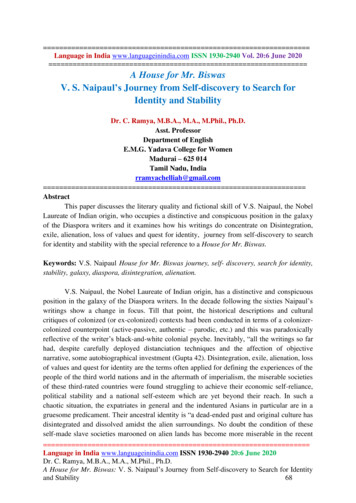
Transcription
Language in India www.languageinindia.com ISSN 1930-2940 Vol. 20:6 June 2020 A House for Mr. BiswasV. S. Naipaul’s Journey from Self-discovery to Search forIdentity and StabilityDr. C. Ramya, M.B.A., M.A., M.Phil., Ph.D.Asst. ProfessorDepartment of EnglishE.M.G. Yadava College for WomenMadurai – 625 014Tamil Nadu, Indiarramyachelliah@gmail.com AbstractThis paper discusses the literary quality and fictional skill of V.S. Naipaul, the NobelLaureate of Indian origin, who occupies a distinctive and conspicuous position in the galaxyof the Diaspora writers and it examines how his writings do concentrate on Disintegration,exile, alienation, loss of values and quest for identity, journey from self-discovery to searchfor identity and stability with the special reference to a House for Mr. Biswas.Keywords: V.S. Naipaul House for Mr. Biswas journey, self- discovery, search for identity,stability, galaxy, diaspora, disintegration, alienation.V.S. Naipaul, the Nobel Laureate of Indian origin, has a distinctive and conspicuousposition in the galaxy of the Diaspora writers. In the decade following the sixties Naipaul’swritings show a change in focus. Till that point, the historical descriptions and culturalcritiques of colonized (or ex-colonized) contexts had been conducted in terms of a colonizercolonized counterpoint (active-passive, authentic – parodic, etc.) and this was paradoxicallyreflective of the writer’s black-and-white colonial psyche. Inevitably, “all the writings so farhad, despite carefully deployed distanciation techniques and the affection of objectivenarrative, some autobiographical investment (Gupta 42). Disintegration, exile, alienation, lossof values and quest for identity are the terms often applied for defining the experiences of thepeople of the third world nations and in the aftermath of imperialism, the miserable societiesof these third-rated countries were found struggling to achieve their economic self-reliance,political stability and a national self-esteem which are yet beyond their reach. In such achaotic situation, the expatriates in general and the indentured Asians in particular are in agruesome predicament. Their ancestral identity is “a dead-ended past and original culture hasdisintegrated and dissolved amidst the alien surroundings. No doubt the condition of theseself-made slave societies marooned on alien lands has become more miserable in the recent Language in India www.languageinindia.com ISSN 1930-2940 20:6 June 2020Dr. C. Ramya, M.B.A., M.A., M.Phil., Ph.D.A House for Mr. Biswas: V. S. Naipaul’s Journey from Self-discovery to Search for Identityand Stability68
whirlwind of globalization and the throes of marginalization, deracination, disintegration andnowhereness have become more painful and unbearable than ever” (Singh vii). Having aterrifying passion for truth, even if it is sour, Naipaul has undoubtedly emerged as arelentlessly truthful delineator of the gruesome maladies of the immigrants and his novelspresent” a true picture of the indentured Indians – rather Asians in their floatsam existence asderelict peoples in the wilderness of the modern world” (P viii).V.S. Naipaul, better known by his initials. is one of the few original voices of ourtimes. He was born in Trinidad on 17th August 1932 as a member of a minority’ race andreligion. His family was a part of the Hindu Indian community of workers and pettymerchants important to that part of the British Empire to serve the commercial interests of theEmpire. From an early age, Naipaul displayed a distaste not only for the traditional Hinduway of life followed by his ancestors but also for the slave society of Trinidad whichremained under British rule till 1962. When he was in the fourth form at Queen’s RoyalCollege in Port of Spain, the capital of Trinidad, he wrote a vow in his Kennedy’s RevisedLatin Primer to leave Trinidad within five years. However, it took him six years to redeemhis vow. V.S. Naipaul left Trinidad for England in 1950, graduated in English from OxfordUniversity in 1953 and settled in London afterwards. He has to his credit publication of suchnotable novels as 1.The Mystic Masseur (1957), 2.The Suffrage of Elvira (1958), 3.MiguelStreet (1959), 4.A House for Mr. Biswas (1961), 5.Mr.Stone and the Knights Companion(1963), 6.The Mimic Men (1967), 7.Guerrillas (1975), 8.A Bend in the River (1974), 9.TheEnigma of Arrival (1987), 10.A Way in the World (1994).Even though he hailed from a remote corner of the Third world, he belonged to themainstream of the modern English novel. He received a knighthood in the 1990. New year’sHonours list for services rendered to literature. In 1993, he won the first David Cohen BritishLiterature Prize for a lifetime achievement as an author. In addition to the above, he is arecipient of Rhys Memorial Prize in 1958, Maugham Award in 1961, Phoenix Trust Awardin1962, Hawthorne den Prize in 1964, Smith Literary Award in 1968, Arts Council Grant in1969, Booker Prize in 1971, Bennett Award in 1980, Jerusalem Prize in 1983 and T.S. EliotAward in 1986. Having been born and brought up in the slave society of colonial Trinidad,Naipaul felt lonely in metropolitan London. He lived in London bedsitters and he wrote:“All mythical lands faded, and in thebig city I was confined to a smaller worldthen I had ever known. I became my flat,my desk, my name” (19).Often, nodding off with the electric heater on, he would wake to a nightmare that hewas in topical Trinidad. Though living mainly in London, he travelled frequently in the WestIndies, North and South America, India and Africa. However, he found every country to be anightmare for an uprooted man like himself. Naipaul’s creative power was shaped by the Language in India www.languageinindia.com ISSN 1930-2940 20:6 June 2020Dr. C. Ramya, M.B.A., M.A., M.Phil., Ph.D.A House for Mr. Biswas: V. S. Naipaul’s Journey from Self-discovery to Search for Identityand Stability69
acute perception of his own displacement and his fiction deals with the twentieth centurythemes of the fragmentation of the social order, the sense of the void, the meaningless ofendeavour in an amoral universe and the absurdity of man’s situation. Exile is the spur aswell as the subject of his writing. Totally isolated by his displacement and temperament fromallegiance to any country, community or creed, he examines the world with an uncloudedeye. In his country marked by political upheaval, mass migration, colonization andrevolution, it is inevitable that much of the modern literature should be literature of the exile.The writings of V.S .Naipaul too, draw upon an experience totally based on alienation andexile. “All his novels deal with the displaced or dispossessed who do not have, never had, andby the nature of things, never could have, a home against which their condition of exile canbe assessed” (Joshi 11). No doubt, his works are paradigmatic of the whole genre, therebyforming a major current in twentieth century life, thought and art.In all his works, his own mind and the environment that brought it into being is hismain subject. Being an exile, his basic response to this condition is a search for identity. Hiswriting is a process of self-discovery. Cut off from his actual home, he rebuilds the lost homein fictional terms with the help of words. The exile’s sense of isolation, the ache of notbelonging is clearly evident in all the works of V. S. Naipaul. In his novels, he has charted thecourse of his self-discovery – from a search for identity to the complete desolationexperienced by the permanent exile. V.S. Naipaul’s reminiscences of his early life in Trinidadand his efforts as a youth in London to establish himself as a writer recur throughout hiswork. “His relations with people he meets in the course of his travels affect the very nature ofhis memories and enlarge his perspective on his heritage” says A. N. Yadav (P 25); thereligion and customs of immigrants from colonial India who settled in colonial Trinidad didobviously affect his literary and imaginative perspective. Lillian Feder comments:“In every country he, Naipaul was concernedwith the relation of the historical past even inits seeming absence – to the present. The mostintense personal reaction he records isempathy with the heirs of a history ofslavery and colonialism, the economic, culturaland psychological oppression and especiallythe assaults on individual identity withwhich they still contend” (P 13).V.S. Naipaul grew up in the West Indies after slavery had been abolished, but thememories of colonialism and slavery still haunted the islands in which he grew up. TheBritish governed the colony and the people of the island were encouraged to think of Trinidadas ‘Little England’. His early childhood was spent in the reconstructed India. The Indianswho came to Trinidad as the immigrant labourers were mostly from the villages. Theyformed close-knit communities and sought to deny the finality of their transference by rigid Language in India www.languageinindia.com ISSN 1930-2940 20:6 June 2020Dr. C. Ramya, M.B.A., M.A., M.Phil., Ph.D.A House for Mr. Biswas: V. S. Naipaul’s Journey from Self-discovery to Search for Identityand Stability70
observance of ritual. As soon as he had left his village, the immigrant Indian carried hisvillage with him. “Naipaul is the product of a distinct combination of circumstances. ABrahmin Hindu born in Trinidad, he is an Indian by ancestry, Trinidadian by activity andBritish by residence. He found the squalor of Trinidad stifling to his spirit. The childhood andyouth spent in Trinidad, the bond between father and son and the Hindu background – thesethree strands of his personal life were conspicuous shaping factors of Naipaul’s sensibility”(Yadav 26). According to A.C. derrick, “one major thematic strand runs through all thenovels of V.S. Naipaul: whether set in the West Indies or in England, they are satiricdemonstrations of individual and social limitations. The social condition that Naipaulrepresents in his novels is shoddy and limiting, offering little more than on absurd orridiculous existence. Repeatedly he shows the frustration of energy and ambition. Success isthe reward of trickery, vulgar materialism, self-delusion or the values of the coloniesmonkey-game’. For the individual, rebellion or non-acquiescence proves a largely futileexercise. The theme of personal failure dominates all of Naipaul’s work” (Pant 37). In thewords of Suman Gupta,“Naipaul has engaged with a wide variety ofinterlinked issues and contexts: the issuesrange from personal history to the historicaldetermination of culture and society; fromcolonization to the constitution of post-colonialstates; from the complexities of specificracial groups, religious communities, andnationalities, to the broader concerns ofhuman spiritual needs, intellectual life,political ideology; from fiction to realityand from fantasy to truth Naipaul isultimately memorable not merely for his thoughtsand ideas but because he is a good, perhapsgreat, writer of books” (P 97).The features like a recurring image, idea or character type point to some deepimpression made on the writer’s mind by a particular experience or event in his life. Heconsciously uses the novel to define his position and to impose order in his life. Bruce Kingwrites: While novels and short stories have seldom been about himself, they have reflectedthe various stages of his disillusionment with Trinidad, his despair with India and his concernwith being a homeless excolonial” (P 108). Naipaul is an articulate critic, not only of societyand literature in general but of his own life and work as well. In 1958, in The RegionalBarrier”, he speculated about his limited prospects as a novelist thus:“The social comedies I write can be fully appreciatedonly by someone who knows the region I write about. Language in India www.languageinindia.com ISSN 1930-2940 20:6 June 2020Dr. C. Ramya, M.B.A., M.A., M.Phil., Ph.D.A House for Mr. Biswas: V. S. Naipaul’s Journey from Self-discovery to Search for Identityand Stability71
Without that knowledge, it is easy for my booksto be dismissed as farces and my charactersas eccentrics It isn’t easy for the exoticwriter to get his work accepted as beingmore than something exotic; something to bejudged on its merits” (P 21).Living in England, he depends on an English audience, but he writes about thestranded Indian community in the West Indian island of Trinidad. Consequently, he feels thatthe major obstacle between him and his audience is a geopolitical boundary. Feeling thenecessity of a tradition on which to build, Naipaul turned with a kind of romanticizedveneration to English and European writers. There, of course, his regional barrier intervened.He said thus:“To us, without a mythology, all literatureswere foreign Trinidad was small, remoteand unimportant, and we knew we could nothope to read in books of the life we sawabout us. Books came from afar; they couldoffer only fantasy” (New Statesman 452)Naipaul’s fantasy resulted in a habit which he described as a ‘process of adaptation”.His writing them, is “an ordering of experience”. It is a “shaping rather than an inventiveimagination” (White 24).In his novels, he presents facts as fiction and fiction itself is seen as a way ofunderstanding the factual world. Literature and life interpenetrate, fiction and non-fictioncomplement and counterpoint each other. For he himself said in an article entitled “London”as:“Unless I am unable to refresh myse
College in Port of Spain, the capital of Trinidad, he wrote a vow in his Kennedy’s Revised Latin Primer to leave Trinidad within five years. However, it took him six years to redeem his vow. V.S. Naipaul left Trinidad for England in 1950, graduated in English from Oxford University in 1953 and settled in London afterwards. He has to his credit publication of such notable novels as 1.The .











